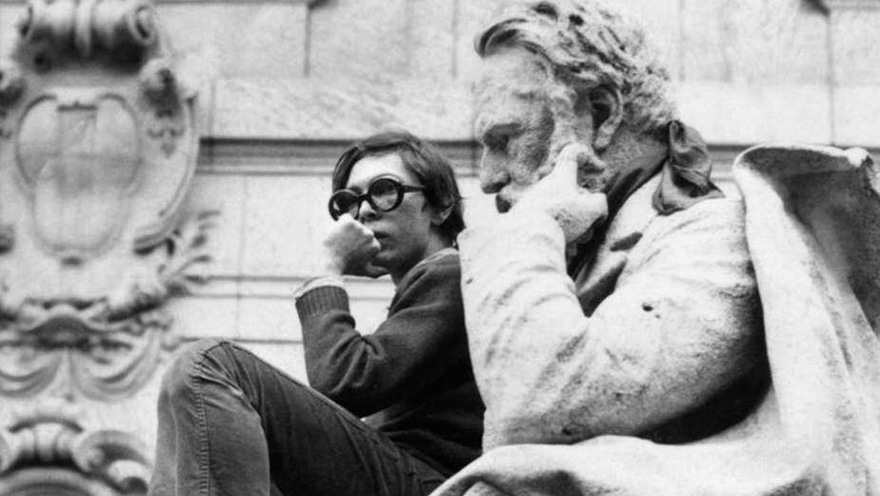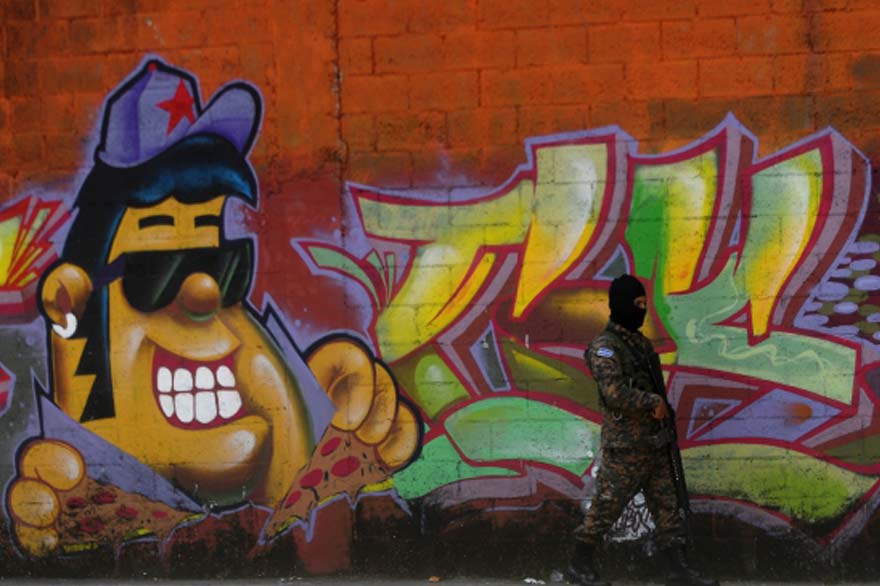More than two centuries later, the passions relating to 1789 are far from being extinguished: one need only mention the name Robespierre to immediately reappear in debates that could indeed be considered closed. Contrary to what the historian François Furet said (his formula "the Revolution is over" appears for the first time in his pen in 1978), we can think that the Revolution is not really over.
Therefore, half a century later, how could it be considered that May 1968 is! How could the page be turned, when the distance separating us from the confrontations of that time is still modest on the scale of History? How could we reduce to a simple question of historical knowledge the tensions and confrontations of ideas on the meaning or scope of facts that are only fifty years old?
The emergence of a juvenile actor
The actors and witnesses of the "events" of 1968, as those most hostile to the May Movement used to say, are still numerous in this world: the collective memory is strong with countless individual memories, active and contrasted, sometimes changing as well, as any memory. May 1968 still belongs to its actors and witnesses.
But fifty years have gone by, as much as what separated the end of the First World War from that same May 1968, long since written in school textbooks, and which now also belongs to history.
More precisely, isn't the French May Day such a singular historical moment, when an actor emerging from a new, post-industrial era - the student movement - emerges, juvenile, in the public space and draws into its mobilization the declining actor of a dying, industrial era - the workers' movement - which then experiences its last fires?
In any case, since 1968, there has not been a major historical episode, war, colonization or decolonization, or even a huge cultural and social upheaval, even if there have been major economic crises. Between 1918 and 1968, the French had experienced the Leagues and the fascist peril of 1934, the Popular Front, the Second World War, the Indochina War, the Algerian War... then nothing on this scale, except perhaps, more recently, the contemporary terrorism of jihad, the war against Daech, the horrors of Charlie and the Hypercacher (January 2015), the Bataclan (November 2015) or Nice (July 2016).
Remembrance and commemoration
The fiftieth anniversary of May 1968 may seem strange, since it is, at the same time, a time of remembrance and commemoration, of memory and history, in a time, moreover, when "presentism", to use the historian's beautiful expression François Hartog (2003)...seems to trump history.
But we still need to agree on the historical periodization, indeed, and to ask ourselves about the rupture that May 1968 may constitute: if it concludes a phase from which France has emerged from History, if it inaugurates a post-historical period that will prove to be half a century long, if it is a question of seeing it as the moment of a rupture, then what about another periodization, which in 1973 situates the real transformation of our country, like others?
May 1968 is indeed a period of rapid growth, and has nothing to do with the consequences of the Yom Kippur War (October 1973) and the first oil shock, with the accelerated changes in immigration, which becomes populated while it was working, with the accelerated changes in the organization of work and management, with the beginning of mass unemployment and exclusion, with the prodromes of urban crisis and, finally, with the end of the Glorious Thirties, which was not at all in question in 1968.
This might invite us to distinguish between cultural change, which is indeed spectacular with 68, and political, social and economic transformations, which come much later.
A planetary movement
But 68 is not the monopoly of France, it is a worldwide phenomenon, one would say "global" today, but at the risk of anachronism. The movement of that time, in its cultural, youthful, student protest, pre-existed the "events" of the French May proper.
Those who, at the time, showed the most understanding of the student revolt inaugurated in France at the University of Nanterre with the March 22nd movement, sociologists Alain Touraine and Edgar Morin in particular, date the birth of this worldwide set of protests in 1964, and the Free Speech Movement at Berkeley, when students at that California university protested the ban on political activity there.
And before the beautiful month of May, at the end of January 1968, in Poland, the protest against the regime took the form of a demonstration against the censorship which had just banned a show. Here too, it took on a cultural, intellectual and student dimension, with, what would be the specificity of protests in Central Europe, a strong political and anti-totalitarian impact.
In some respects, however, this challenge placed this country, and others at the same time, in the great global wave of what would become the '68 movement. In February, for example, Czechoslovakia began the "Prague Spring," and in Italy students occupied the University of Rome. Then, many countries on all continents will experience strong protest movements.
France was therefore part of a global movement that was inaugurated before May 1968 and of which it has also become in the world's imagination a high place, perhaps even the most central, the most significant.

Debate between Daniel Cohn-Bendit and Alain Geismar
This debate was conducted by Michel Wieviorka.
Daniel Cohn-Bendit: I've decided I won't say anything for the 50th anniversary of '68 - except with you two! I did the 2 years, the 10 years, the 15 years, the 20 years, the 25 years, the 30 years, the 35 years, the 40 years, the 45 years, I have nothing more to say!
Alain Geismar: I have personally accepted a few filmed appointments, but very few. Maybe we'll do the 100 years!

Today, we talk about '68, we commemorate, we criticize, it is still part of the lived experience of many people who do not necessarily see major breakthroughs since then. Between 1918 and 1968, so much happened that for those who were there in '68, 1918 was a different planet. In the meantime there was the 1929 crisis, the Popular Front, Nazism, Fascism, the Second World War, the Indochina and Algerian wars.
There hasn't been anything like it since 1968, so maybe we're still a little bit on the same track. It's not the same relationship to history. Maybe we've even come out of History, out of the great History, with 1968.
"Society's couch"
A. G. : There must indeed be something left in the air of time so that, not so long ago, Nicolas Sarkozy made his own the idea that it was necessary to finish killing 68. This proved, at the time at least, that 68 for the French right had remained a monster to be exterminated. I still think that for young people it lost most of the meaning that it had had for a very long time.
D. B.C. : What is certain is that most political actors up to Sarkozy have always referred to 68. Even Macron in his analysis of history spoke of the period of the revolt. Sixty-eight remains to this day a reference for political actors, whether positive or negative. This was true for Mitterrand: the Joint Programme...change your life, etc. In 1981, he was back, or rather, trying to catch his breath from 1968. It's something that made an impression.
Then, for the young people, what Alain says is true. Personally, I consider myself 68 as the couch of this society. As soon as someone sees me, it's first 1968, then we talk about Europe, ecology and so on.

For the young people, one part asks me: "How did you get society going? "Sixty-eight is a myth, it's the myth of "You can do anything". For some young people, and at least for those involved in politics, it remains a myth.
The social dimension
A. G. : You're right. You're right. But a dimension of sixty-eight at least has, in my opinion, vanished: the social dimension, the strike, the demands, the Grenelle agreements. When you explain that the minimum wage has increased by 30 % in one night, it seems unlikely. All this is hidden, including by the unions, we don't hear about it.
M.W: In the imagination, 68, before being trade unionism, the CGT, Grenelle, is the student movement, the cultural rupture. People first think of that when they think of '68.
A. G. : There were five, eight, or ten million strikers, this is no longer claimed, and is no longer present when we think back to May 68. On the one hand, the last to have taken this dimension was the French Democratic Confederation of Labour (CFDT) with the company trade union section. Then, at one point, the CFDT went instead to seek agreements with the CGT and eliminated part of the 68th culture it carried.
D. B.C. : The CFDT had attempted to link works councils and self-management.
A. G. : Absolutely, but when Lip ended, the CFDT also thought and made it clear that workers' utopia was no longer on the agenda.
MR. W: What about culture, on the "student movement" side?
D. B.C. : What is brilliant in the book by Edgar Morin, Cornelius Castoriadis and Claude Lefort is, as the title indicates, that, "The rift" (Morin, Lefort and Castoriadis, 1968). The student movement has opened a huge breach in which a working class youth has engaged. The CGT was then pushed to get involved, and, to plug the breach, came this idea from the Grenelle. And fifty years later, when you want to make a big negotiation, what do you do? A Grenelle!
The student movement has opened a breach into which society, at various levels, has said: "We are falling into it. »
When you see what Jacques Chirac decided with Séguy at the Grenelle... We were stupid enough to say, "It's nothing. "But still! Trade unions in companies, vocational training, the increase in the minimum wage by 30 %, it was a new social reality that rushed into this breach.
Social and cultural modernity
MR. W: In today's imagination of what 68 was, this social, working-class side is more or less erased. Sixty-eight is essentially cultural, "It is forbidden to forbid", "Everything is possible", and this is also a bit what Morin, Lefort and Castoriadis write in their book.

D.C.B: For me, the rift stayed in my head. Today, it must be said: we can no longer dissociate the two aspects. We can no longer dissociate on the one hand this cultural movement, this desire to live differently, to say that we no longer want post-war society with this morality that no longer corresponds to anything, and on the other hand this entry into the modernity of French society, the beginning of social modernity.
GA : This social modernity was also the irruption of the world of specialized workers (OS), which today no longer exists, or very little. These SOs were peasants who had left the land because there was no more work and who therefore ended up in the factories, then immigrant workers recruited massively to meet the need for labour.
M.W: An expression that has disappeared from our vocabulary. We no longer say "immigrant workers".
D. B.C. : We're talking about migrants, we're talking about refugees. But it is the immigrant workers who have made part of several European countries, since the end of the 1950s, Germany, Holland, Belgium.
A. G. : Cars all over Europe have been made with immigrant workers.
MR. W: So what you both say, and what I find surprising, is that the cultural, student breach has actually opened up the whole social field. And the first thing we need to talk about is what happened on that front?
A. G. : Or not. We have to talk about it!
D. B.C. : We must finally be able to bring this development into line. There is a third dimension which has lasted much longer and which obliges us to be much more critical of ourselves. If you accept this idea of modernity, cultural and social, we can say that we have taken an infinite amount of time to kill the phraseology, the revolutionary leftist ideology. What is contradictory is that a breach has been opened, and that those who expressed themselves in this breach were from the past, Mao for example. […]
In the post '68 trap
D. B.C. : Our starting point was different. When Alain tries to make a synthesis between the libertarians and the Maoists, it's the air of the 1970s with the struggles in Italy, and so on.
The sad thing is that after '68, we ourselves fell into the trap. For me, from 1968 to 1974-1975, the idea of revolution had been made possible. The Trotskyists, like Romain Goupil...thought it was just a dress rehearsal, everyone was in that fantasy. What we didn't understand was that the process of the end, Grenelle, buried the revolutionary idea and even radicalism.

Took me four, five years to figure it out. And for me, there was the ideological rupture, I was self-managing, without a party. I hadn't understood that in May 1968, if the masses began to move, it was because, unlike the crypto-professional revolutionaries that we were, people wanted to live and not to make a permanent revolution.
After a while it stops, the desire for life begins again. Understanding this was the first breakthrough that led to green movements in Germany.
Social movements are like the tides, they rise. And you can do whatever you want, it's bound to go back down.
The only way to stabilize social movements when they rise is to be in the political institutions. That's what paved the way for me to become an environmentalist...
MR. W: And in France this leads to Mitterrand with the Union of the Left.
A. G. : The SP, as I met it, had absorbed a lot of former leftist activists, etc. The PS, as I met it, had absorbed a lot of former leftist activists, etc. The PS, as I met it, had absorbed a lot of former leftist activists.
D. B.C. : Ecology has developed in a different way in France. One could choose to reform the PS or try to do something else.
Coming back to the "Macron loop", once you accept the discourse and the need for a reformist approach, the evolution of society can lead to supporting things that may surprise you. For example, the fact that the environmentalists are in coalition with the social democrats has led to a full-blown fight among environmentalists. Then there was the debate on pacifism, on Bosnia.
Can the environmentalists not form a coalition with the Christian Democrats? As soon as you can think about this kind of problem, it becomes possible to support Macron.
GA : What made me decide to vote for Macron when I no longer wanted to petition, what was decisive...was his position on the Front National. All these people who are playing with a rising Front National, which has gone from 20 % to 40 %, that's the problem! Macron's ideas didn't particularly offend me. Opening up the spectrum of possible games in French opinion, why not, everything else has gone wrong, it must be said.
Michel WieviorkaSociologist, President of the FMSH, Fondation Maison des Sciences de l'Homme (FMSH) - USPC
The original text of this article and the debate was published on The Conversationeditorial partner of UP' Magazine
Anything to add? Say it as a comment.












